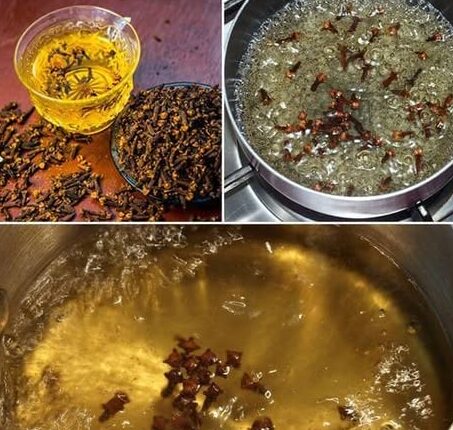Clove tea, made from the dried flower buds of the clove tree (Syzygium aromaticum), is a warm, aromatic beverage cherished for its rich flavor and impressive health profile. With a history rooted in traditional medicine across various cultures, clove tea offers a range of wellness benefits. While it’s not a cure-all, adding this soothing brew to your daily routine may help support overall health when paired with a balanced diet and healthy lifestyle.
Key Compounds in Cloves
- Eugenol: A potent compound known for its antibacterial, antifungal, and anti-inflammatory properties.
- Antioxidants: Cloves contain flavonoids and other antioxidants that help protect cells against oxidative stress.
- Vitamins and Minerals: Trace amounts of vitamin C, K, and manganese contribute to its nutritional value.
Potential Health Benefits of Clove Tea
1. Digestive Aid:
- Reduces Bloating and Gas: Clove’s natural enzymes can help improve digestion and ease discomfort caused by gas and bloating.
- Supports Gut Health: Its antimicrobial properties may assist in maintaining a balanced gut microbiome.
2. Immune System Support:
- Antimicrobial Effects: The eugenol in cloves helps combat certain bacteria and fungi, potentially aiding in infection prevention.
- Antioxidant Protection: By neutralizing free radicals, clove tea may support the immune system’s ability to function optimally.
3. Inflammation and Pain Relief:
- Anti-Inflammatory Properties: Eugenol’s anti-inflammatory action can help soothe minor aches, muscle soreness, and even reduce gum and tooth discomfort.
- Joint and Muscle Comfort: Enjoying a warm cup after exercise or a long day may provide mild relief.
4. Respiratory Health:
- Clears Congestion: The aromatic compounds can help ease breathing by reducing congestion and soothing irritated airways.
- Calming for the Throat: Clove tea’s soothing warmth may help alleviate minor throat irritation.
5. Blood Sugar and Circulation:
- Potential Blood Sugar Management: Some studies suggest that clove compounds may support healthy blood sugar levels when combined with a balanced diet.
- Cardiovascular Health: Improved circulation from antioxidants and anti-inflammatory effects contributes to overall cardiovascular well-being.
How to Make Clove Tea
Ingredients:
- 1–2 teaspoons whole cloves (or ½–1 teaspoon ground cloves)
- 2 cups water
- Optional: cinnamon stick, ginger, or a slice of lemon for extra flavor
- Honey or a natural sweetener (optional)
Instructions:
- Boil Water: Bring the water to a gentle boil in a small pot.
- Add Cloves: Add the cloves (and any other optional spices) to the boiling water.
- Simmer: Reduce heat and let it simmer for 5–10 minutes. The longer it simmers, the stronger the flavor.
- Strain and Serve: Strain the tea into a cup and sweeten if desired. Enjoy warm.
Tips and Precautions
- Start Small: Clove tea has a strong flavor. Begin with a weaker brew and adjust to taste.
- Moderation is Key: Consume in moderate amounts (1–2 cups a day) to avoid stomach irritation or other side effects, especially if you have a sensitive stomach.
- Medical Conditions: If you have specific health conditions, are on medications (especially blood thinners), or are pregnant, consult a healthcare professional before adding clove tea to your regimen.
- Allergies and Sensitivities: Discontinue use if you experience any adverse reactions such as rash, nausea, or discomfort.
Bottom Line
Clove tea is a fragrant, warming beverage that not only pleases the palate but also delivers a variety of potential health benefits, from aiding digestion to supporting the immune system. While not a panacea, this traditional brew can be a pleasant addition to a health-conscious lifestyle. Just remember to enjoy it in moderation and pair it with other wholesome habits for the best results.







